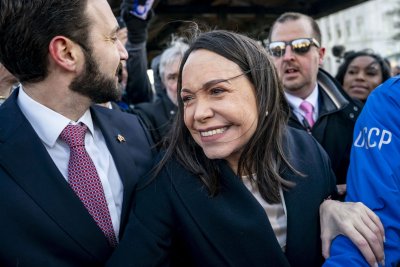Venezuela opposition leader Machado presents Trump with her Nobel Prize

Jan. 15 (UPI) — President Donald Trump on Thursday greeted Venezuelan opposition leader Maria Corina Machado at the White House where she presented him with her Nobel Peace Prize medal, which he accepted.
Machado, leader of the Venezuela’s center-right Vente Venezuela party, was awarded the medal, which Trump heavily campaigned for, last year for her work to promote democratic rights in her South American nation.
“It was a Great Honor to meet Maria Corina Machado, of Venezuela, today,” Trump said on his Truth Social platform. “She is a wonderful woman who has been through so much. Maria presented me with her Nobel Peace Prize for the work I have done. Such a wonderful gesture of mutual respect.”
In presenting the medal to Trump, she said it is a symbol of the unity of their two peoples on the ideals of freedom, sovereignty and democratic dignity.
“It is also a profound expression of gratitude for the invaluable support of President Trump and the United States for the Venezuelan people in this decisive struggle for our independence and the restoration of popular sovereignty,” she said, according to a statement from her Vente Venezuela party.
The American president has long sought to be awarded the Nobel Peace Prize. Machado first publicly offered to give her medal to Trump earlier this month for the U.S. military operation that resulted in the seizure of Venezuela’s authoritarian president, Nicolas Maduro.
The Norwegian Nobel Committee and the Norwegian Nobel Institute responded to the situation with a statement that “Once a Nobel Prize is announced, it cannot be revoked, shared or transferred to others. The decision is final and stands for all time” — a statement it reiterated on Thursday.
“A medal can change owners, but the title of a Nobel Peace Prize laureate cannot,” it said.
During her visit to Washington, Machado also visited with Republican and Democrat lawmakers at the Capitol.
“I want to assure you that we are going to turn Venezuela into a free and safe country, and into the strongest ally the United States has ever had in this region — when Venezuela is free,” she said.
Ahead of Venezuela’s 2024 election, Machado won her primary bid to oppose Maduro, but was banned from running. Candidate Edmundo Gonzalez was widely seen as having won the election, but the state-run election agency named Maduro the winner.
Machado then left the country.
Despite the removal of Maduro, Maduro’s government remains in power, with Delcy Rodriguez, former vice president of Venezuela, serving as the country’s interim leader.
“If one day, as acting president, I have to go to Washington, I will do so with my head held high, not on my knees,” Rodriguez told lawmakers Thursday in a jab at Machado.
